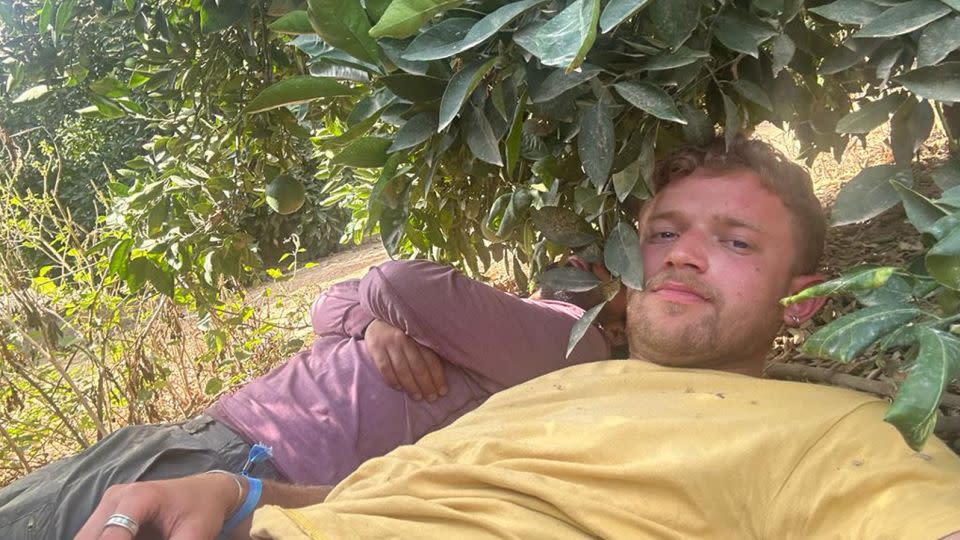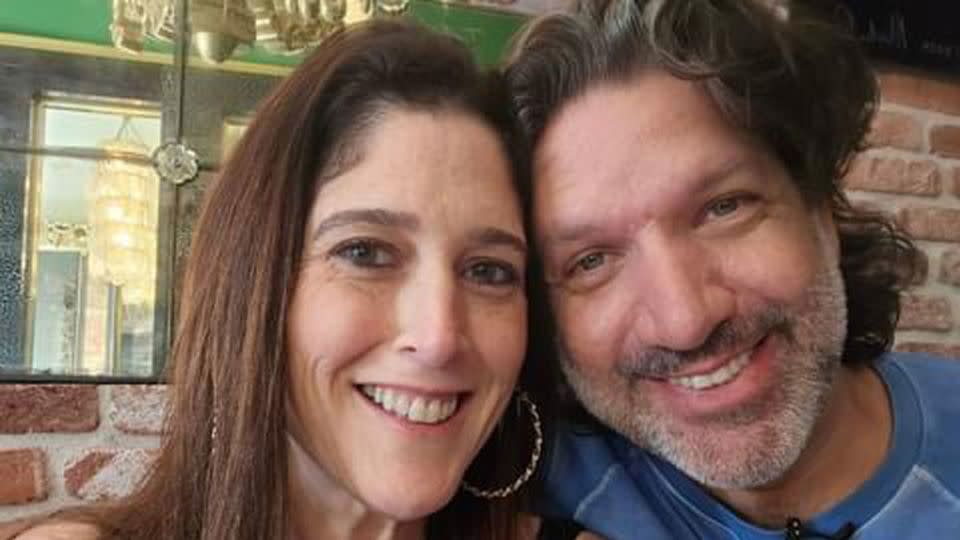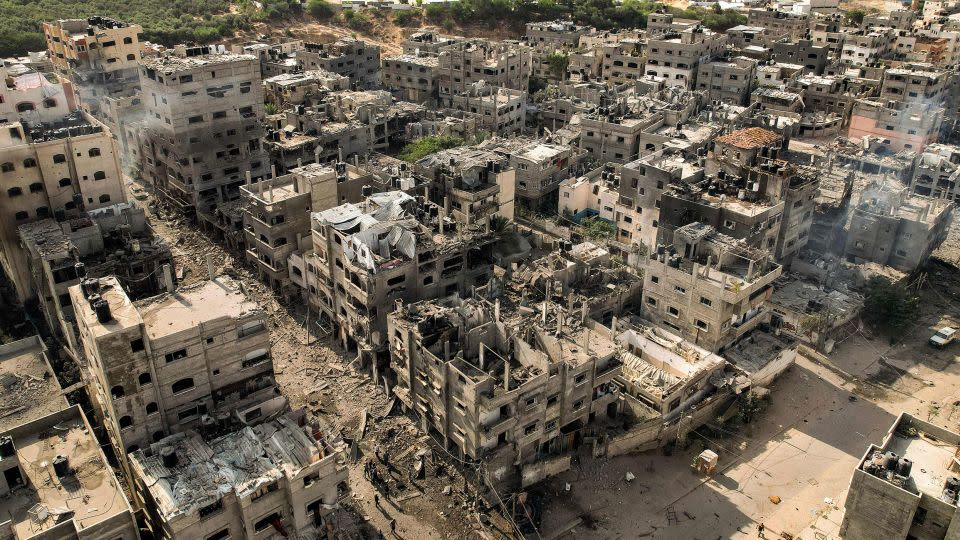Opinion: What the war is revealing
Editor’s Note: Sign up to get this weekly column as a newsletter. We’re looking back at the strongest, smartest opinion takes of the week from CNN and other outlets.
“We live in the first period in history in which there is such full awareness of cruelty and killing as they happen,” wrote British philosopher Jonathan Glover in 1999, at the end of a decade that saw genocidal killing in Rwanda and Bosnia and of a century that saw at least 187 million people die in war.
How we respond to barbarity is crucial, he wrote in his book, “Humanity: A Moral History of the Twentieth Century.”
“We can start to establish a tradition that, with our knowledge of the atrocities, we find them intolerable and will do what we can to eradicate them. Or we can help to continue a tradition which accepts them fatalistically.”
Such questions came into sharp relief again after the brutality of the Hamas attack on Israel last weekend was revealed. The war plays out on everyone’s screens, forcing people to confront cruelty and killing and to fear what comes next.
As Frida Ghitis wrote, Hamas “launched thousands of rockets as its operatives infiltrated Israeli territory using motorcycles, trucks, paragliders, and speedboats.”
“Inside Israel, they went after soldiers and civilians, even posting videos on social media, as the world saw evidence of how they targeted, hunted down, and brutalized Israelis of all ages. Many were kidnapped and taken to Gaza and dragged through the streets.”
Ghitis added, “There’s much that Israel has done wrong. But nothing justifies what Hamas has just perpetrated. As many knowledgeable people have pointed out, what Hamas has done is clearly an act of terrorism, no matter what your definition.”
Amy Klein, a writer based in New York whose husband has family in Israel and served in its army, began receiving messages asking, “Is your family okay?”
“They were safe, but they were not all right…”
“With over 1,000 Israelis dead and counting, thousands injured and as many as 150 Israelis feared kidnapped – graphic videos showing scores of twentysomethings being shot point blank at a desert rave, women stripped and bloodied, the elderly, children and babies snatched and tormented, people screaming for their lives on terrorists’ motorcycles, piles of bodies found at kibbutzim – no one in Israel is all right.”
“And most Jews in America are not all right either.”
A music festival

“We were dancing,” recalled Gal Katz, “the sun was just coming up.” The 22-year-old was at a music festival when he saw signs of Israel’s Iron Dome system intercepting missiles from Gaza. “At first I was like, ‘Oh, it’s missiles.’ In Israel, this is nothing special. I figured if it was something serious, [music festival security] would end the party and tell us what to do.” Then a friend posted a video on WhatsApp showing a white pickup truck carrying at least six gunmen dressed in black. “It’s a truck full of terrorists in Israel, in the middle of a city nearby.”
“I understood that what we’re dealing with is something that’s never been here before. I took a look at that video and it was like ‘Call of Duty.’”
Katz and a friend ran to a nearby orange grove, where they hid quietly for about six hours out of sight of the attackers until they were rescued by soldiers. Other friends sought safety in shelters but were discovered by Hamas.
“We came together to the party. And they didn’t make it. They didn’t return home.”
“They took 1,200 lives and maybe 200 kidnapped, and people are still missing and wounded.
“It’s the most Jews that have been killed since the Holocaust. How can you accept that?”
A kibbutz
The attack came a day after residents of the Be’eri kibbutz celebrated the 77th anniversary of its founding. Yulie Ben Ami, 27, grew up in the kibbutz, in southern Israel, with her parents and two siblings.
“At 9:30, my mom sent me a message that the terrorists were trying to get into the house and they tried to break the door — that they were shooting into the safe place,” Ben Ami told CNN Opinion’s Stephanie Griffith. “She wrote that she’s scared and doesn’t know what to do. And I think like 10 or 15 minutes later, my mother and my father sent us a message that they [the attackers] are in the house and are breaking everything. At 10:06, my father sent us a message: ‘They are in the safe room. They caught us.’”
“A half hour later, we saw a picture on Telegram of my father with two men who were taking him someplace — we don’t know where.”
“We don’t know what happened to my mom, she wasn’t in that picture.”
“I think the world needs to understand what the gunmen did to children and mothers and grandmothers and grandfathers…” More than 120 people were killed by the terrorists at the kibbutz.
Israelis were stunned by the scale and ferocity of last weekend’s assaults. “This attack is being compared to the 1973 Yom Kippur War when Arab armies surprised Israel almost 50 years ago to the day,” wrote Janine Zacharia, a journalist who covered Israel for two decades. “But this is more traumatic. Not only because of the sheer number of murdered young civilians — in addition to young soldiers. But because of the way the horror is unfolding live on television, radio and social media and the way Prime Minister Benjamin Netanyahu’s government — that millions of Israelis have been protesting for months over right-wing attempts to weaken the judiciary — seems completely absent and incompetent.”
Pogrom

S. Ilan Troen is named “for a grandmother who was murdered in her village, Derazhne, near Rovno (now Rivne) in what was once Poland and is now Ukraine. Her death in the spring of 1919 came during a stretch of time when 150,000 Jews were murdered. Ukrainian leader Symon Petliura’s banditim, or criminal bandits, intoxicated with nationalist-religious fervor, attacked a small, peaceful, agricultural village, where they murdered and violated Jews.”
It was a pogrom, wrote Troen, who is an emeritus professor of history at Ben-Gurion University in Israel and of Israel studies at Brandeis University in the US. Last week, his own family once again came face to face with the reality of that kind of murder.
The word pogrom, taken from the Russian language, Troen noted, “is an official act by a government or similar polity, not the mere sick initiative of a single antisemite engaged in a limited one-off event. The historical progression of pogroms is clear: Eastern European antisemitism to Nazi racism that extended across most Europe to the current Hamas brutality against Jewish civilians wherever they find them.”
“My mother witnessed her mother’s brutal end but somehow survived. The scar remained throughout her life, though, and affected how she so determinedly cared for and protected her own children.”
“It is now my daughter, Deborah Mathias, who was so brutally murdered, together with her husband, Shlomi Mathias, in a kibbutz on the Gaza border, where they were committed to mutual understanding and peaceful coexistence. They were shot in the presence of their son, whose life was saved by my daughter using her body to shield him as she fell. He is recovering from a bullet that passed through her into his abdomen. He is mending, but that experience will remain and will be passed on.”
“’Never again!’ It was never supposed to have happened. But it has, and is. We are witnessing in real time a pogrom. We thought that the most extensive pogrom — the Holocaust — would mark the end of the terrible record of violence against Jews, just because they are Jews. Not so.”
In Gaza

Israel struck back with air attacks against targets in the Gaza Strip, home to more than 2 million people and ruled by Hamas. “In Gaza, we have all been glued to the news for the last five days, watching in disbelief as strikes and counterstrikes have been exchanged and the death counts on both sides of the border mount,” wrote Omar Ghraieb. “While every round of violence starts differently, they all end the same way here: with Palestinians paying a heavy price. We live in perpetual anticipation of a tragic ending.”
“Our electricity falters, our water is scarce, and the air outside my home fills with thick smoke and acrid gunpowder. My throat and eyes burn. It’s too dangerous to venture out for bread, yet my thoughts drift to the guilty pleasure of an iced salted caramel macchiato that might bring inner peace, or at least some temporary distraction. What more can one expect from a Gaza millennial living in the impoverished coastal enclave that some call the world’s largest open-air prison, under a suffocating blockade for more than 15 years?”
The ramifications
The threat Hamas posed to Israel was well known, wrote Carrie Cordero. “Hamas’ mission is, by definition, to end Israel, not to seek to establish a self-governed Palestinian state that peacefully coexists alongside the Jewish state. Like Americans before 9/11, Israelis should have been better protected by their government. Their confidence in their elected leaders, intelligence and security services has likely been deeply shaken.”
Cordero called for Congress to elect a new speaker immediately and to renew Section 702 of the Foreign Intelligence Surveillance Act, which would allow continued intelligence collection on national security threats, including the actions of terrorist groups.
It’s too soon to tell if the Hamas attack will end discussions between Saudi Arabia, Israel and the US on a deal to normalize relations. “An Israeli normalization deal with Saudi Arabia — the location of the two holiest sites in Islam — would be hugely symbolic and have real security benefits for Israel,” wrote Peter Bergen. “After all, almost exactly half a century ago, during the 1973 Yom Kippur War, two Arab states, Egypt and Syria, attacked Israel. Also, both Israel and Saudi Arabia have a strong common interest today, both seeing Iran as their most dangerous enemy.”
Jason Greenblatt, who served as Middle East envoy in the Trump administration, said last weekend’s events made clear one obstacle to a two-state solution. “Israel cannot achieve peace with Palestinians when a segment of the Palestinian population still intends to destroy it. Israel cannot make peace when the leaders of the Palestinians include Hamas. Or when a member of Fatah, Hamas’ political opponent and the party that runs the Palestinian Authority in the West Bank, expresses not sorrow over the loss of innocent life, but celebrates a ‘morning of victory, joy, and pride’ and urges all Palestinians to participate in the terror against Israel.”
The echoes of the Hamas assault could be heard on some of America’s college campuses, where pro-Palestinian student groups rallied. At Harvard University, wrote Rachel Fish, “a group of 30 student associations issued a public statement over the weekend to say they ‘hold the Israeli regime entirely responsible for all unfolding violence,’” a statement some student groups later backed away from.
“When the administration finally weighed in, the first take was a milquetoast, word-salad statement signed by 18 administrators,” observed Fish, who is special advisor to the president for the Antisemitism Initiative at Brandeis University in Higher Education and K-12 Leadership. As controversy grew, Harvard’s president issued a statement Tuesday condemning “the terrorist atrocities perpetrated by Hamas.’”
Fish argued, “This is a time for presidents, trustees, deans, provosts and donors to articulate that there are no mental hurdles that should ever be jumped to rationalize the destruction and inhumanity perpetrated by Hamas.”
For more:
Kara Alaimo: Schools are right to warn parents about what their kids are seeing now
Peter Bergen: The 9/11 attack wasn’t an intelligence failure. The Hamas attack may be
After McCarthy

After ousting House Speaker Kevin McCarthy, Republicans have yet to round up enough votes to elect a replacement. In the meantime, the House cannot carry out its legislative duties, including responding to the Middle East crisis. Although House Republicans privately voted to pick Rep. Steve Scalise as their leader, he dropped out Thursday after he was not able to line up the 217 GOP votes needed to win that post in a full House vote. Rep. Jim Jordan won an intra-party vote Friday, but he too may struggle to line up the required number of votes on the House floor, Julian Zelizer noted.
“The election of Jordan, who former Speaker John Boehner called a ‘legislative terrorist,’ would put one of the most radical members of the party in charge, someone who would have little problem sending the government into a shutdown,” observed Zelizer.
Animating McCarthy’s foes was a belief that he wasn’t serious enough about cutting spending, wrote W. James Antle III.
“Republicans have campaigned for decades on the idea that the country’s current fiscal trajectory is unsustainable, most recently making the argument that elevated federal spending levels had proved inflationary.”
“Where the eight Republicans who seized McCarthy’s gavel get into trouble is that it is impossible to alter that fiscal trajectory while controlling by the narrowest of margins one half of the legislative branch. They simply don’t have the votes to pass the kind of sweeping spending cuts they would like, and their attempts to govern as a minority within a small majority make it difficult to govern at all.”
For more:
John Avlon: The solution to the House speaker crisis

Sky-high credit card rates
As the Federal Reserve has steadily raised interest rates over the past two years, the rise in the average mortgage rate (to more than 7%) and its impact on homebuyers has gotten lots of attention. Less talked about is an even more devastating increase that hits the many Americans who have credit card debt.
“The average credit card interest rate in America is a shocking, all-time record of 24.45%,” noted Sallie Krawcheck and Victoria Sado. “By comparison, in 2018, the average credit card interest rate was 14.22%. Pair that with data that shows those hikes overlapped with consumers’ increases in spending outpacing their increases in income … and ouch.”
“The gender debt gap means women especially feel this. And because of the gender pay gap, women are less likely than men to pay bills on time and in full.” Krawcheck and Sado outlined six ways to help cope with the rising cost of debt.
RFK Jr. goes independent
Robert F. Kennedy Jr. announced Monday that he’ll drop out of the Democratic presidential primary and run for the White House as an independent. His third-party bid could take votes from both President Joe Biden and his Republican challenger, wrote Peter Bergen.
“Kennedy holds a mix of Republican and Democratic policy views which could make him attractive to the large numbers of American voters who are unhappy about a Biden-Trump rematch,” Bergen observed.
“On the Ukraine war, pandemic measures, US border policies, and the Second Amendment, RFK Jr. could easily be mistaken for a Republican, while on abortion, affirmative action and climate change, he sounds very much like a Democrat. All of this makes Kennedy a wild card who may scramble the presidential election and damage both Biden and Trump in unexpected ways.”

Don’t miss
Jill Filipovic: Why Gavin Newsom’s vetoes are so disappointing
Sarah Gundle: Bob Saget’s widow isn’t alone in grappling with what happens when dating and grieving collide
Sara Stewart: Why I can’t stop thinking about Julia Ormond’s story
Keldy Ortiz: Retailers are closing stores. There are better ways to deal with shoplifting
Dr. Lara Freidenfelds: The truth behind menopause test kits
AND…
Simone Biles

Simone Biles is “the most decorated gymnast” ever, Amy Bass wrote. Her record defies “common sense: 37 total world and Olympic medals, including five in Antwerp, where she clinched her sixth all-around title 10 years after she won her first. Her road back to the sport she not only dominates, but defines, challenges anyone who fails to understand that athletes must care for their mental, not just physical, health.”
“In Tokyo, just over two years ago,” Bass noted, “Biles shocked the sports world when she announced that she was sitting down, letting her teammates continue the Olympic quest without her because she had the ‘twisties,’ a word used to describe what happens when a gymnast’s mind and body are out of sync … She was not OK, and she was brave enough to say it out loud.”
By the time the world championship competition ended last weekend in Antwerp, Belgium, Biles had walked away with four golds and a silver. “Her glorious return to the world stage, and the records she owns because of it, demonstrate the beauty of sport when it is not a zero-sum game based solely on winning.”
For more CNN news and newsletters create an account at CNN.com

 Yahoo News
Yahoo News 
